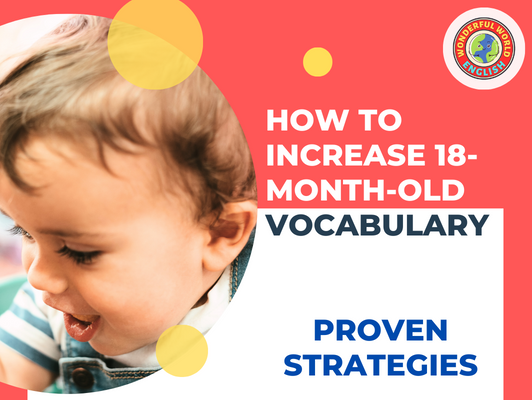Contents
Toggle
Meet David De’ Ath, founder, editor, and writer at Wonderful World English. With his extensive background as an English teacher, David provides valuable insights and practical tips on ESL for students and teachers alike.
Language development is a critical aspect of a child’s growth, and the period around 18 months marks a significant phase where toddlers often experience a surge in their vocabulary.
At this age, a child’s brain is rapidly absorbing information and learning new communication methods.
Enhancing an 18-month-old’s vocabulary involves understanding the normal language milestones they should reach and engaging in activities stimulating their linguistic skills.
Strategies that incorporate playtime with learning can effectively combine toddlers’ natural curiosity with opportunities to introduce new words.
Creating a language-rich environment is another core component of fostering vocabulary growth in young children.
Caregivers must consistently interact with their children, using clear and descriptive language in everyday situations.
Simple tasks like narrating daily routines or reading colorful books together can significantly impact a child’s word acquisition.
Moreover, by providing encouragement and a positive atmosphere, caregivers can support their toddlers in trying new words and sounds without fear of making mistakes, promoting confidence and skill in using language.
Key Takeaways
- Children’s brains at 18 months are primed for language acquisition.
- Daily interactions and narrated activities enrich vocabulary.
- A positive, encouraging environment supports language confidence.
Understanding Language Milestones
When assessing the language development of an 18-month-old, it’s crucial to be aware of the typical speech milestones and recognize potential signs of speech delay.
This knowledge allows parents and caregivers to track progress and seek professional advice when necessary.
Recognizing Typical Speech Development
At around six months, infants typically start to babble, combining vowels and consonants like “baba” or “yaya.”
As they approach 18 months, their vocabulary expands rapidly.
They often understand the names of familiar people, body parts, and objects.
It’s normal for children at this age to say as many as 10 to 20 words.
Between 18 and 24 months, toddlers usually experience a significant increase in word acquisition, and by 24 months, they might have a vocabulary of approximately 200 words.
Identifying Signs of Speech Delay
It is recommended that parents and caregivers observe their child’s language milestones closely.
Signs of speech delay may include not babbling by the age of 6 months or struggling to speak any words by the age of 18 months.
If, by 24 months, they have not started to combine words into short phrases or sentences, this could be another indication.
To assess and address any issues, consulting with a pediatrician or a speech-language pathologist can provide guidance and, if necessary, intervention strategies.

Creating a Language-Rich Environment
A language-rich environment is crucial for an 18-month-old’s vocabulary development.
Parents and caregivers can nurture toddlers’ language skills through dedicated communication strategies, engaging storytelling, and musical activities that attract and hold a child’s interest.
Talking to Your Child Regularly
Communication lies at the heart of language development.
Parents should aim to engage in meaningful conversations with their toddler throughout the day.
Describing actions and objects in the environment introduces new words and contextualizes them, enhancing a child’s understanding.
A strategy known as **parallel-talk allows the parent to narrate the child’s activities, thereby modeling proper language use.
- During mealtime: Talk about the colors, shapes, and textures of food.
- While playing: Describe what the toys are and what they can do.
For more strategies: Communication and language strategies for children.
Introducing Books and Reading Aloud
Books serve as powerful tools for introducing new vocabulary.
Parents should select age-appropriate picture books and spend time reading aloud to their child.
During these sessions, they can point to pictures and connect the words to the images.
This not only fosters word recognition but also comprehension skills.
- Choosing books: Look for books with large, colorful illustrations and simple text.
- Reading routine: Build a daily habit by setting aside a specific time for reading.
For tips on language development through reading: Language development at 18 months.
Incorporating Music and Rhymes
Songs and nursery rhymes are not only enjoyable for children but are also educational.
The repetitive nature of music and rhythm facilitates memorization and familiarizes toddlers with the sounds of language.
Parents can integrate singing sessions into their daily routines to encourage toddlers to vocalize and eventually sing along.
- Simple songs: Select songs with simple melodies and repetitive lyrics.
- Hand motions and gestures: Accompany nursery rhymes with actions to reinforce language through movement.
For the benefits of a language-rich environment: Talk, Read and Sing Together Every Day!.

Activities to Boost Vocabulary
Introducing an 18-month-old to interactive activities can significantly advance their language skills.
Through carefully selected play, educational toys, and social engagement, vocabulary development becomes both enjoyable and effective.
Engaging Through Play
Encourage language development activities through imaginative play scenarios that require your child to express themselves.
Constructing simple stories using stuffed animals can spur their imagination and increase their vocabulary.
For instance, they can learn new words like “tall” when describing a giraffe or “jump” when playing with a kangaroo toy.
Learning with Educational Toys
Provide toys that are designed for learning, such as puzzles with pictures and words or interactive electronic devices that pronounce words.
These educational toys often incorporate sounds and images to aid in vocabulary development.
Toys like these can help make the connection between objects and their names, reinforcing word recognition and usage.
Encouraging Social Interaction
Children learn language by listening and mimicking.
Thus, it’s key to promote social interaction with peers and adults.
Organized activities such as group storytime or singing sessions allow children to hear new words in context and practice them in a social setting.
This not only helps with vocabulary but also with speech patterns and the rhythm of language.
As mentioned above, games are very effective in aiding language development.
For a guide on some of the BEST games to learn English, check out the guide below!
Related: Best Games to Learn English: Ultimate Guide

Support and Guidance for Caregivers
The developmental milestones of an 18-month-old include significant advancements in vocabulary.
Caregivers play a crucial role in nurturing this growth.
Below, key strategies are detailed, including when to consult a speech therapist and effective parenting tips.
Consulting Speech Therapists
If caregivers have concerns about a child’s language development, they should consider scheduling an appointment with a speech therapist.
These professionals assess, diagnose, and treat communication disorders.
They provide tailored speech therapy plans that cater to each child’s specific needs, ensuring that developmental milestones are met effectively.
As we all know, they grow up fast!
Our guide linked below is packed full of tips on how to teach English to kids.
For some inspiration on teaching an 18-month-old or to help prepare for when they are older, we hope it can be of value to you.
Related: How to Teach English to Kids – A Teacher’s Guide
Parenting Tips and Tricks
To bolster vocabulary growth, caregivers can incorporate several parenting tips into daily interactions:
- Engage in Constant Communication: Talk to the child throughout the day about what they see, hear, and do. Use clear and simple sentences to describe actions and objects.
- Read Together: Choose age-appropriate books and read aloud to the child, pointing to and naming objects and characters. Visiting the library can introduce them to new books regularly.
- Be a Good Speech Model: Speak clearly and use proper grammar, allowing the child to mimic and learn.
- Encourage Interaction: Prompt the child to use words by asking questions and waiting for their response, even if it’s non-verbal.
Integrating these strategies into daily routines can profoundly impact the child’s burgeoning communication skills.

Conclusion
Language development is a crucial part of a child’s growth, and around 18 months, toddlers undergo a significant surge in vocabulary.
To enhance this development, creating a language-rich environment and engaging in activities that stimulate their linguistic skills is essential.
Parents and caregivers play a key role in this process, using daily interactions and narrated activities to enrich the child’s vocabulary and support language confidence.
Understanding typical speech milestones helps in recognizing the normal progress and potential signs of speech delay.
Strategies like parallel talk, where parents narrate the child’s activities, and introducing books and reading aloud are powerful tools for introducing new vocabulary.
Incorporating music and nursery rhymes also aids in language development by facilitating memorization and familiarizing toddlers with language sounds.
If caregivers have concerns about a child’s language development, it’s vital to consult speech therapists.
Parenting tips like constant communication, reading together, being a good speech model, and encouraging interaction can significantly aid a child’s linguistic growth.
By integrating these strategies into daily routines, caregivers can effectively nurture their toddlers’ language development, laying a strong foundation for their future communication skills.
We hope you find value in this guide, you can reach out to us if you are in need of any support.
Have a wonderful day!
Image Attribution: All images licensed via canva.com





